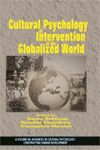
Cultural Psychology of Intervention in the Globalized World
Edited by:
Sanna Schliewe, Centre for Cultural Psychology Aalborg University, Denmark
Nandita Chaudhary, University of Delhi
Giuseppina Marsico, University of Salerno
A volume in the series: Advances in Cultural Psychology: Constructing Human Development. Editor(s): Jaan Valsiner, Niels Bohr Professor of Cultural Psychology, Aalborg University.
Published 2018
The interventions have ranged between benevolent exchanges to powerful influences as well as military domination. Although interpersonal and group influence has been an important domain of study in Social Psychology, we propose to take a fresh look at these phenomena from the specific orientations provided by the discipline of Cultural Psychology.
In this perspective, meaning making processes becomes a key for understanding the everyday experiences of the receivers and agents of intervention.
In this volume, we see how attending to meaning-making processes becomes crucial when researching or intervening within cultural encounters and global everyday life.
It is through listening to the foreign other, to attend to their immediate experiences, as well as exploring how meaning may be mediated and co-constructed by them in everyday life through organizational structures, informal peer network, traditional rituals or symbols, that collaboration can be created and sustained.
CONTENTS
Series Editor’s Preface: Sincere Desires for Improvements in the Globalizing World, Jaan Valsiner. Editors’ Introduction: Weaving Culture Plot: Intervention at the intersection of Borders and Community in a Changing World, Sanna Schliewe, Giuseppina Marsico, and Nandita Chaudhary. PART I: PRINCIPLES OF INTERVENTION. Therapy as Anthropology, Jacob Mosgaard. The Fuel and the Engine: A General Semio-Cultural Psychological Framework for Social Intervention, Viviana Fini and Sergio Salvatore. PART II: COMMUNITY INTERVENTIONS—IN EUROPE AND LATIN AMERICA. Homes as Intervention Forms, Amrei C. Joerchel and Stephan Dietrich. Psychosocial Interventions in the Context of Forced Migration: Empowerment and Social Action, Lenssa Mohammed. A Culture of Peace: Social Action Learning and Peace-Building in Mexico Through the Educational System, Elena de Casas and Peter Berliner. Amerindian Support Network, Melina Bertholdo and Danilo Guimarães. The Reconstruction of a New System of Needs After a Post-War Emergency, Emiliana Mangone. PART III: GLOBAL MOBILE AGENTS AS RECEIVERS OF INTERVENTION. Global Health Intervention from Global North To South: (Academic) Preparation of Students, Rashmi Singla and Louise Mubanda Rasmussen. Industrial Citizenship and International Mobility: Employer’s Interventions into the State of Welfare of Danish and Finnish ‘Expats’ in India, Nicol Foulkes Savinetti. Relocation Services for Families in Geographical Itinerancy: Beyond the “Cultural Problem” Déborah Levitan, Tania Zittoun, and Flavia Cangià. PART IV: THE EVERYDAY LIFE OF GLOBAL MOBILE AGENTS. The Mobile Life-World Map: A Dialogical Tool for Understanding Expatriates, Sanna Schliewe. Strangers in Foreign Lands: Entering the Missionary Field, Zachary Beckstead. Identity Negotiation Across Cultures: A Case Study of International Women Aid Workers, Alice Gritti. Who is an ‘Expatriate’? Euro-American Identities, Race, and Integration in Postcolonial India, Shalini Grover. Here to Stay: How Relationships, Results, and Grit Characterize Exemplary International Aid Workers, R. Scott Breslin. Biographies.
-
Paperback978-1-64113-285-5
Web price: $45.04 (Reg. 52.99)
-
Hardcover978-1-64113-286-2
Web price: $80.74 (Reg. 94.99)
- eBook978-1-64113-287-9

-
 Culture, Work and Psychology
Invitations to Dialogue
Culture, Work and Psychology
Invitations to Dialogue
-
 Deep Loyalties
Values in Military Lives
Deep Loyalties
Values in Military Lives
-
 Drama of Multilingualism
Literature Review and Liberation
Drama of Multilingualism
Literature Review and Liberation
-
 From Dream to Action
Imagination and (Im)Possible Futures
From Dream to Action
Imagination and (Im)Possible Futures
-
 Home in Transition
The Cultural Construction of Heimat
Home in Transition
The Cultural Construction of Heimat
-
 Making of Distinctions
Towards a Social Science of Inclusive Oppositions
Making of Distinctions
Towards a Social Science of Inclusive Oppositions
-
 Ornamented Lives
Ornamented Lives

